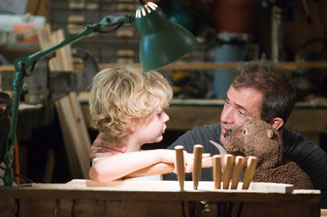|
|
Movie Review: The BeaverBy Matthew HuntleyMay 12, 2011
They react to his talking through a puppet the way characters in movies do, not the way real people do. Granted, this is a movie, but because it’s so earnest with the way it views depression, why couldn’t it be just as real about the way it sees Walter’s actions? I mean, the guy is talking with a beaver puppet for crying out loud! Don’t you think somebody would speak out a little more and start knocking on his head, saying, “Hello, anybody home?” Everyone just seems too willing to accept it. Were Walter’s past treatments so outrageous that something like a talking beaver seems tame by comparison? I also found it unbelievable that things changed for Walter so quickly after he started talking with the puppet. Within a day, he’s laughing and having dinner with his family; he’s fixing the faucet; he’s making love with Meredith; and he’s developing a new beaver toy that starts selling out. The film seemed to jump to these points too fast, although I did appreciate that Walter’s treatment was seen as temporary, which is further evidence the film knows what it’s dealing with. Ultimately, The Beaver earns its emotion and drama, and aside from an artificial shot that shows two characters running off in slow motion, the ending feels right and true. Jodie Foster has crafted an odd story for sure, but it’s odd in a good way. The cast, led by the still versatile Gibson, is strong and committed, and it means something when my biggest complaint about the film is that it doesn’t go on long enough.
|

|
|
|

|
Friday, November 1, 2024
© 2024 Box Office Prophets, a division of One Of Us, Inc.


